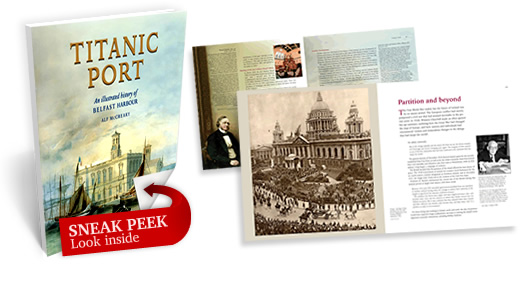The House of Lords was the suitably grand venue for the London launch of Alf McCreary’s magnificently illustrated tome Titanic Port, a history of Belfast Harbour. Before I got a chance to take a good look at my copy, my ears pricked up when the chairman of the harbour commissioners Len O’Hagan said hopes were high that Northern Ireland would “soon be allowed to set its own rate of corporation tax”. Sitting nearby was the Secretary of State Owen Paterson who didn’t move a muscle when the words were spoken.
The idea, apparently setting the tax at a rate rivalling or perhaps even less than the Republic’s would be the coping stone for the enterprise zone that the whole of Northern Ireland would become next year, it’s hoped. David Cameron had promised something like this if he won the election, without going into details or even knowing what they might be at that point.
The zone would allow the Port of Belfast in particular to compete with Dublin Docks under a preferential tax regime for a set period of years. The idea recalls Charlie Haughey’s creation of the enterprise zone in the down -at -heel Dublin port area that was one of the foundations of the Celtic Tiger.
While my scepticism is less than it was, it would still be unwise to think this is a done deal. If the O’Hagan kite flies it will be likely to provoke howls of protest in other equally deserving regions of the UK and prompt fears of a reduction in the block grant of between £200m and £250m. The risks as well as the opportunities would be considerable to put it mildly and the challenge to business virtually unprecedented.
As for the volume Titanic Port , it’s a magnificently illustrated coffee table book for Christmas, and an absorbing if mainly celebratory read ( the Harbour Commissioners commissioned it). It recounts Belfast’s progress from modest village on the Farset to international port in less than two hundred years. It’s not exactly a new tale but the facts have been updated and never before have they been so handsomely laid out. The big Belfast names are given biographies and faces – Ritchie, Dargan, Mitchell, Herdman, Harland, Wolff, Pirrie, Thompson, Sinclair, Rebbeck. The grandee Harbour Commissioners are seen in their finery of tailcoats, top hats and cashmere waistcoats.
While the portraits are of the bosses the workers do get a look in, even Jim Larkin’s strikers of 1907 and Wee Joe Devlin’s headcount of “only one or two Catholics in the whole port” with a pilot the highest graded. Sam Thompson’s trail blazing play of sectarian conflict, Over the Bridge is commemorated.
There’s plenty of Titanic in the book of course but this one ill-fated ship is not allowed to overshadow the epic story. Tension is sometimes recorded between the titans of the Yard and the Port but was usually resolved. And this is just as well, for it is the Port which has survived as a major enterprise upon which much depends for Northern Ireland’s future.
Former BBC journalist and manager in Belfast, Manchester and London, Editor Spolight; Political Editor BBC NI; Current Affairs Commissioning editor BBC Radio 4; Editor Political and Parliamentary Programmes, BBC Westminster; former London Editor Belfast Telegraph. Hon Senior Research Fellow, The Constitution Unit, Univ Coll. London
Discover more from Slugger O'Toole
Subscribe to get the latest posts to your email.
